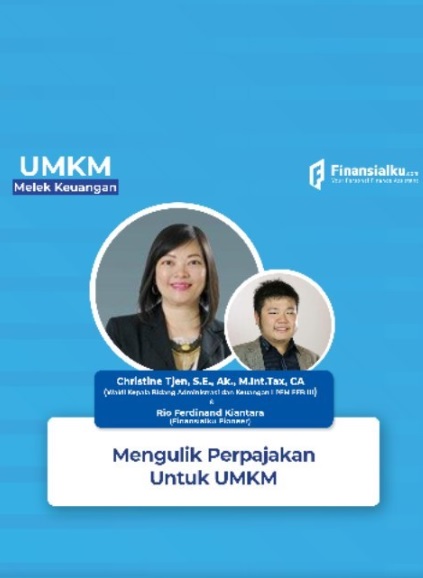MSME Financial Literacy – Taxation for MSMEs
Hana Fajria – Public Relations of FEB UI
Depok – (5/8/2020) Finansialku_com held an online chat on basic taxation for new MSMEs, using “igtv” with resource persons Christien Tjen, SE, Ak., M.Int.Tax, CA., Deputy Head of Administration and Finance LPEM FEB UI, who is also the Coordinator of the Tax Education and Research Center – Institute for Economic and Social Research (TERC-LPEM). The event was hosted by Rio Ferdinand Kiantara, Finansialku Pioneer and an Achievement Accounting Student of FEB UI.
Christien commenced the chat with an explanation of the definition of tax. Taxes are mandatory contributions to the state that are owed by taxpayers, be they individuals or entities, which can be enforced due to laws. Taxes are important because they are the backbone of a country. It is also important for SMEs to pay taxes, because the income they earn must also contribute to the state. Both for large and small taxpayers.
General types of taxes include taxes such as central and local taxes, central taxes such as PPH; local taxes, for example PBB, BPHTB, and others. Small, Micro and Medium Enterprises (UMKM), that have a maximum turnover of Rp. 4.8 billion, are subject to a tariff of 0.5%, which has been applicable since July 2018 until present. This tariff has decreased from a previous 1%. For the use of PPH 23, there is a choice of time period, if it is personal, it can only be for 7 years if the limited company lasts 3 years. For Cooperatives/ CV, it is applicable for 4 years.
This change in MSME rates is stated in Government Regulation (PP) Number 23 of 2018, concerning Income Tax on Income from Businesses Received or Obtained by Taxpayers with a Certain Gross Circulation. This Government Regulation replaces the previous regulation, namely Government Regulation (PP) Number 46 of 2013.
Tips and tricks for tax management are available for paying taxes properly. If one pays too little taxes, one can be subject to sanctions; if one pays excess taxes, liquidity can be affected. To carry out tax obligations properly, MSMEs must register their NPWP (tax number), then calculate, and pay and report taxes annually by filling out form no. 1770 for individuals, or form no. 1771 for companies.
The requirements for registering NPWP for entrepreneurs, include photocopies of identity cards, photocopies of business certificates or also known as SKUs from sub-districts or departments related to the line of business, photocopies of family cards (mandatory if the registrant is a wife), in addition to it is completed by filling out a business statement form signed on a stamp duty of Rp. 6000, and also filling out and signing the NPWP registration form provided at the tax office.
NPWP registration can also be done online via the https://ereg.pajak.go.id site by filling in personal data on that page, instead of coming to the tax office in person. In the case of entrepreneurs, coming directly to the tax office is advisable.
After making payment, the final thing to do is to report the Annual SPT. This Annual SPT reporting can be done at the tax office or through the online site at pajak.go.id. Payment can be made via ATM, m-banking or at the bank via teller, post office, and most recently through marketplace applications, making it easier for taxpayers to pay their taxes every month. Micro businesses do not need bookkeeping, just concise notes, and must be diligent in recording their turnovers.
During this pandemic, the government provided MSME with incentives, which the government will bear until December 2020. For complete information, please visit www.pajak.go.id/covid19 by reporting monthly.
By utilizing technological advances that make it easier for taxpayers, it is hoped that MSMEs in particular and all Indonesians in general can fulfill their tax obligations in an orderly manner. (hjtp)
(am)



